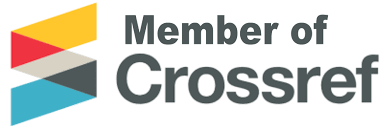The Development of Management Theory in Business Organizations, an Overview of the Science Philosophy Perspective
Abstract
Based on the philosophy of science, the development of management science uses the perspective of ontology, epistemology, and axiology. In the perspective of ontology, the essence of management theory in business organizations is the science that offers a management process so that business organizations can achieve their goals. The final goal to be achieved by the process this management is the achievement or fulfillment of goals that have been set. Based on an epistemological perspective, management theory in business organizations introduces methods or ways of making decisions or solving problems that can be used by managers in running business organizations. In addition, management science introduces various management theories to be practiced in business activities. In an axiological perspective, ethical values and social responsibility must be a serious concern in applying management science to business organizations. In management theory, business orientation is not only looking for profit but also give attention to the norms prevailing in society and give attention to the interests and welfare of all parties. Because management theory has the perspective of ontology, epistemology, and axiology, management theory is really a philosophy of science. Therefore, management theory needs to be developed to be implemented in business organizations.
Keywords
Full Text:
PDFReferences
Adams, Susan et al. 2019. Principles of Management. Texas: Openstax, Rice University.
Bahrum. 2013. Ontologi, Epistemologi, dan Aksiologi. Sulesana, Vol. 8 (2).
Basri. 2013. Epistemologi Psikologi Islam. Miqot. Vol. 37 (1)
Bergeron, Bryan. 2003. Essentials of Knowledge Management. New Jersey: John Wiley & Sons, Inc.
Biyanto. 2015. Filsafat Ilmu dan Keislaman. Yogyakarta: Pustakan Pelajar.
Desouza, K. C. and Awazu. Y. 2005. Engaged Knowledge Management: Engagement with New Realities. New York: Palgrave Macmilan.
Fachruddin, Suedi. 2016. Pengantar Filsafat Ilmu. Bogor: Penerbit IPB Press, Kampus IPB Taman Kencana.
Harsono et al. 2002. Bisnis Pengantar. Yogyakarta: STIE YKPN.
Harsono et al. 2010. Manajemen Pengantar. Second Edition, Yogyakarta: STIE YKPN
Jalaluddin and Idi, A. 2007. Filsafat Pendidikan. Yogjakarta: Ar-Ruzz Media.
Jetter, Antonie., et al. 2006. Knowledge Integration: The Practice of Knowledge Management in Small and Medium Enterprises. New York: Physixa-Verlag Hedelberg.
Lane, Henry W., et al. 2004. The Blackwell Handbook of Global Management: A Guide to Managing Complexity. Malden: Blackwel Publishing, Ltd.
Malian, Sobirin. 2010. Perkembangan Filsafat Ilmu serta Kaitannya denganTeori Hukum. UNISIA, Vol. XXXIII (73)
Mondy, R. Wayne, et.al. 1993. Management: Concepts, Practices, and Skills. Sixth Edition. Singapore: Allyn and Bacon.
Nelson, Bob and Economy, Peter. 2008. The Management Bible. New Jersey: John Wiley & Sons, Inc
Pinder, Craig C. W. 1984. Work Motivation. New York: Scott, Foresman and Company.
Robbins, S. P. and Coulter, M. 2012, Management. Eleventh edition, New Jersey: Prentice Hall.
Sampath, George. 1994. Advanced Level Management of Business. Singapore: Composite Study Aid Publications.
Stoner, James A.F. et. Al. 1995. Management. Sixth Edition. Singapore: Prentice Hall, Inc.
Straub, Joseph and Raymond F. Attner.1994. Introduction to Business. New York: International Thomson Publishing.
Tafsir, Ahmad. 2004. Filsafat Ilmu: Mengurai Ontologi, Espitemologi dan Aksiologi Pengetahuan. Bandung: PT Remaja Bosda Karya.
Widyawati, Setya. 2013. Filsafat Ilmu Sebagai Landasan Pengembangan Ilmu Pendidikan. Gelar, Jurnal Seni Budaya, Vol. 11 (1).
Wibisono, Kunto S. 2006.Sejarah Perkembangan Ilmu Pengetahuan,
Teknologi, dan Seni Suatu Tinjauan dari Perspektif Filsafat. Bahan Kuliah Matakuliah Filsafat llmu, Program Pendidikan Doktor, Fakultas Ekonomika dan Bisnis, Universitas Gadjah Mada, Yogyakarta.
Yukl, Gary A. 1989. Leadership in Organizations. Second Edition. USA: Prentice Hall, Inc.
DOI: https://doi.org/10.35314/inovbiz.v8i1.1312
Refbacks
- There are currently no refbacks.
Copyright (c) 2020 Miswaanto Miswanto

This work is licensed under a Creative Commons Attribution-NonCommercial-ShareAlike 4.0 International License.
This Journal has been listed and indexed in :
Copyright of Jurnal Inovasi Bisnis (p-ISSN : 2338-4840, e-ISSN : 2614-6983)

Inovbiz: Jurnal Inovasi Bisnis is licensed under a Creative Commons Attribution-NonCommercial-ShareAlike 4.0 International License.
Editorial Office :
Pusat Penelitian dan Pengabdian kepada Masyarakat
 Politeknik Negeri BengkalisÂ
Jl. Bathin alam, Sungai Alam Bengkalis-Riau 28711Â
E-mail: inovbiz@polbeng.ac.id














